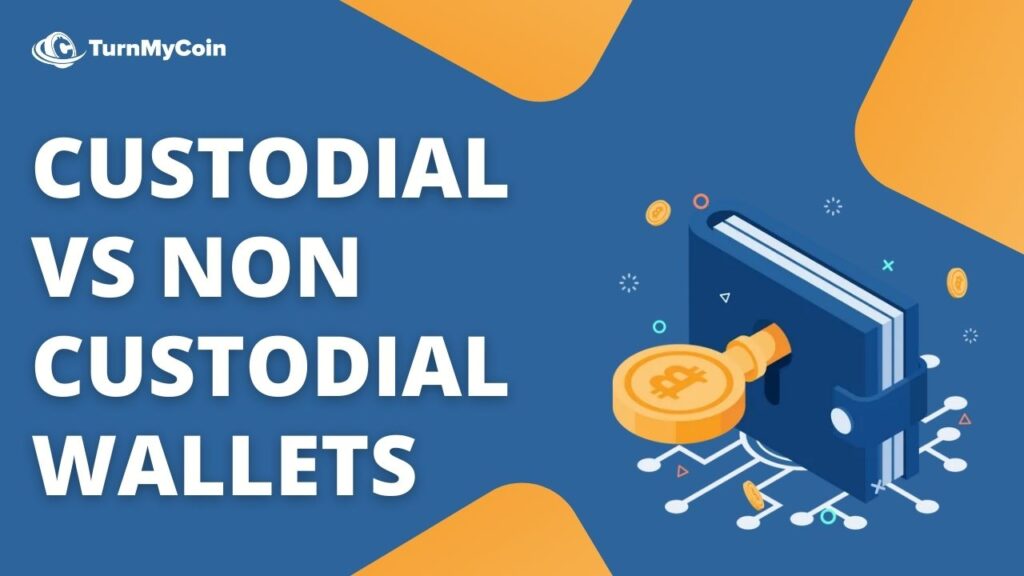
Introduction
Offerings from cryptocurrency exchanges like Binance and Kucoin are examples of custodial wallet services. This is where a third party is in charge of your private keys and, consequently, your cryptocurrency.
Users have total control over their assets when using a non-custodial wallet, such as the MetaMask Wallet, because only they have access to their private keys.
In this article, we will discuss the difference of Custodial Vs Non Custodial Wallets.
Between custodial and non-custodial wallets, there is typically a trade-off between having more direct control and being responsible for less of your cryptocurrency.
Cryptocurrency wallets come in many forms, but they can be divided into two categories: custodial wallets and non-custodial wallets.
You’ve probably already dealt with a cryptocurrency wallet if you own any digital currency. But have not realized it yet. A cryptocurrency wallet is different from a regular wallet where you keep your cash and credit cards.
It’s a widespread misconception that cryptocurrency wallets hold or house a user’s cryptocurrency holdings. Instead, they are merely how users can initiate cryptocurrency transactions and access their funds on the blockchain.
1. Custodial Vs Non Custodial wallets – Ownership

When we talk about ownership of a Cryptocurrency we mean that we take custody of the private key into account and not the value of the currency.
In case of a Custodial wallet, the private key is kept by a custodial wallet service (such as Binance or Kucoin), which protects the user’s money. A non-custodial wallet, on the other hand, gives users complete control over their private keys and sole responsibility for safeguarding their holdings.
Every crypto wallet contains a pair of “keys” — one public and one private — which are lengthy alphanumeric sequences, typically between 25 and 36 characters. Like a bank account number, the public key can be used to send cryptocurrency to the corresponding wallet by anyone who has it.
However, the private key is similar to the PIN code on your debit card and needs to be carefully protected because it gives anyone who has it access to the money in a wallet.
Here is an article that explains Private & Public Key in details for your reference.
2. Definitions – Custodial Wallet Vs Non Custodial Wallet

What Exactly is a Custodial Wallet?
Most frequently offered by centralized cryptocurrency exchanges like Binance, custodial wallets are almost always web-based. In addition, most exchange interfaces are created, so users never even need to interact with their wallets directly.
Beginners typically prefer custodial wallets due to their user-friendliness, for whom the convenience of not having to manage their private key themselves is a significant perk.
Custodial wallets also assure users that they won’t lose access to their money if they forget their password. Providers or exchanges can reset your password by asking you a few security questions.
However, the funds in a non-custodial wallet holder’s account might not be recoverable if they misplace their private key.
To send money using a custodial wallet, a user must first initiate a transaction through their preferred platform and choose a wallet address. To ensure that transactions are completed, the private key’s custodian—in this case, a crypto exchange—is tasked with “signing” them using the private key.

Decentralized applications (dApps) and money-making opportunities like yield farming or staking can be easily connected to custodial wallets.
Theft is huge issue with Custodial Wallets
Hackers frequently target exchanges because they are known to be the owners of private keys, and users interact with their services online.
As a result, cybercriminals profit annually by stealing billions of dollars. If an exchange that holds your personal key file goes out of business, you might even lose your money to a government takeover.
It is crucial to do your research and only use a reputable exchange because using a custodial wallet necessitates high trust in the organization.
Asking about their regulation, security measures for your private keys and insurance options should all be part of that process.
Examples of reputed Custodial Wallet services
Many custodial wallet provider options are available if you prefer simplicity and don’t mind a middleman handling your cryptocurrency—well-known and reputable cryptocurrency exchanges like:
- Bybit,
- Binance,
- Kucoin, and
- Bittrex
make up the majority of businesses offering custodial wallet services.
What are Non-Custodial Wallets?
There’s a cliche in the crypto community that goes, “Not your keys, not your crypto,”. This essentially means that the owner of a private key is the only authentic, verifiable owner of the money stored in that wallet.
When using non-custodial wallets, cryptocurrency users have total control over their funds and private key. Experienced cryptocurrency users typically prefer non-custodial wallets over custodial wallets because they generally are a little more technically complex.
There are different type of non-custodial wallet, some of which are software based while others are Hardware based. Software wallets securely store and encrypt private keys on a computer’s hard drive like Metamask & TrustWallet
However, a hardware wallets are the most secure type of all like Ellipal Titan, Ledger, and Trezor.
Using the private key, transactions are signed on the device itself. Only after it is back online are the transactions sent to the blockchain to be verified. Because of this, non-custodial hardware wallets are practically unhackable.
Users of Non-Custodial Wallets have the autonomy to manage their finances.
Users of non-custodial wallets have the autonomy to manage their finances, but this freedom entails more significant responsibility. You can reset your custodial wallet provider account password if you forget it with a few emails and possibly some identity verification.
However, if you misplace your hardware wallet or private key, you might be unable to access your money.
The good news is that many non-custodial wallet providers provide users with a recovery phrase or “seed phrase”. If a wallet is lost, deleted, or destroyed, this phrase, which consists of 12–24 random words, acts as a backup password recovery method.
However, because anyone who knows the seed phrase can access the account, it should be protected just as carefully as your private key.
The main disadvantage of non-custodial wallets is what it all comes down to. It will be impossible to get your money back if you misplace your private key, wallet, and seed phrase.

List of Reputable Non-Custodial Wallet
Here is a list of reputed Non Custodial Wallet
Software Non – Custodial Wallets: Metamask, TrustWallet, Exodus, Electrum
Hardware Non – Custodial Wallets: Ellipal Titan, Ledger, Trezor
3. Custodial Vs Non Custodial Wallets – Benefits & Shortcomings

Custodial wallets’ benefits and drawbacks
The main drawback of custodial wallets is that you must entrust a third party with your money and private keys, as was previously mentioned. Most of the time, these service providers will also demand identity verification (KYC).
However, the advantage is the convenience and mental clarity. You won’t have to worry about misplacing your private key, and if you experience any issues, you can get in touch with customer support.
Select a reputable business that provides high security and insurance coverage when using custodial services. Be wary of regulated and compliant custodians.
Other requirements may prevent you from being accepted by some crypto custodians. For instance, Binance Custody is a custodial service provider that only takes corporate users.
Non-custodial wallets have advantages and disadvantages.
Non-custodial wallets give you complete control over your keys and money without needing a third-party guardian. So you can be your bank, and your assets are indeed yours.
Non-custodial transactions also move faster because you don’t have to wait for withdrawal approval. Finally, not having a custodian spares you from paying additional custodial fees, which can be expensive depending on the service provider you pick.
Accessibility and Usability are main drawbacks of non-custodial wallets. They typically cause issues for new cryptocurrency owners and are less user-friendly. This ought to be resolved later on as non-custodial service providers develop.
You are responsible for looking after your keys and must exercise caution. This means that you must trust yourself to manage your finances rather than putting your trust in another person.
Which one should you pick?
Choosing which features in a wallet amongst custodial vs non custodial wallets is most significant to you will help you decide between a non-custodial and custodial cryptocurrency wallet type.
Custodial wallets are typically preferred by newcomers and those who value the set-and-forget simplicity of managing their cryptocurrency through an exchange or other centralized wallet provider.
However, Non-custodial wallets are for users who want more control over who has access to their money. Both wallets have advantages and disadvantages, so consider your comfort level with the features that matter to you the most before making a choice.
Additionally, consider each wallet’s benefits, such as the range of supported coins, staking opportunities, cashback rewards, and crypto debit or credit cards.

Closing thoughts
Custodial wallet vs non custodial wallet, which one to choose?
If you want complete control over your assets or use blockchain technology to interact with DeFi applications, you should consider a non-custodial wallet.
However, if you are looking for a service provider who can take care of your storage needs while you trade or invest, you can look for reputable custody portfolio service providers.
Keep in mind that whether you use a custodial or non-custodial wallet, you should always exercise caution and adopt best practices to enhance the security of your funds.


